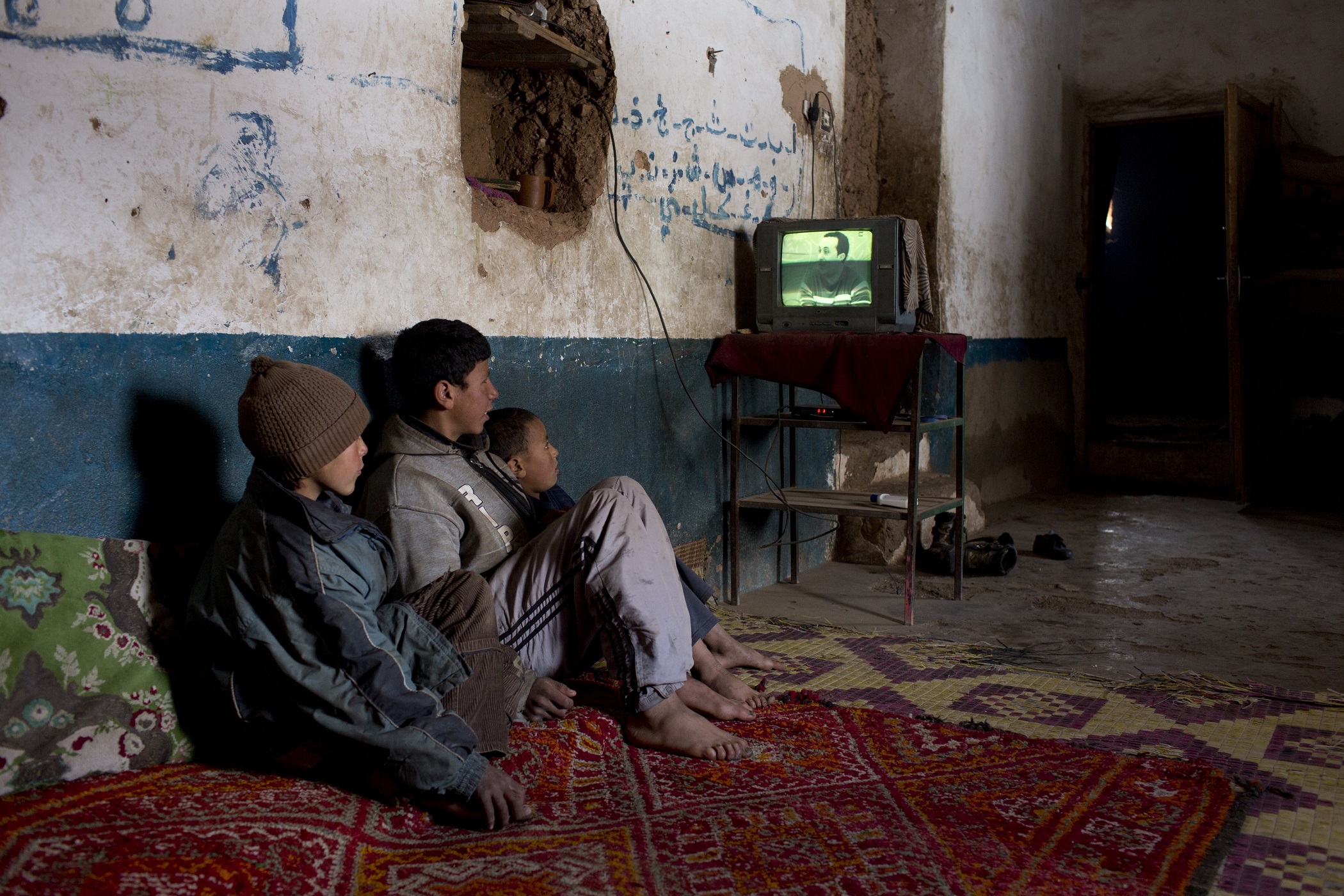تحقّقت مكاسب مهمة لأمازيغ المغرب، بعد مطالب رُفعت منذ تسعينيات القرن الماضي لإنصاف لغتهم وثقافتهم؛ أهمها دسترة الأمازيغية كلغة رسمية للمغرب إلى جانب اللغة العربية وذلك العام 2011، وقبل ذلك إدماج اللغة الأمازيغية في قطاع التعليم، وإطلاق قناة أمازيغية حكومية العام 2010.
لكن هذا لا يعني أن اللغة، قبل إطلاق القناة الأمازيغية التابعة للشركة الوطنية للإذاعة والتلفزة، كانت مُغيّبة بشكل كامل عن الإعلام السمعي البصري الحكومي والصحافة الوطنية. بل أدرِجت قبل ذلك بسنوات نشرات إخبارية وبرامج أمازيغية في القناتين الحكوميتين الأولى والثانية، إضافة إلى تخصيص إذاعة أمازيغية تابعة للشركة الوطنية للإذاعة والتلفزيون، مع وجود صحافة ورقية أمازيغية غير حكومية (وإن كان بعض منها يتلقى دعم وزارة الاتصال).
بعد كل ما تحقق لأمازيغ المغرب حتى الآن في مجال الصحافة والإعلام، يحقّ التساؤل عن قيمة وجود صحافة وقنوات وإذاعات بلغة أمازيغية إلى جانب اللغة العربية مثلا؟ ثم كيف يتفاعل المشاهد أو المستمع أو القارئ الأمازيغي مع الصحافة والإعلام الأمازيغيين؟
ترسيخ التعدد والتنوع اللغويين
يتفق مجموعة من الزملاء، على ضرورة وجود وسائل الإعلام الأمازيغية، التي تعمل على ترسيخ التنوع والتعدد اللغويين على أرض الواقع، وهو ما يؤكده عمر إسرى، رئيس تحرير بالقناة الأمازيغية، بقوله إن "وجود الإعلام الأمازيغي مسألة لا تقبل الجدل؛ باعتبار الإعلام يساهم في تأطير المواطنين وتوعيتهم بحقوقهم وواجباتهم، من خلال وظائف الإخبار والتّثقيف والتّرفيه، باللغة التي يتقنها المشاهد أو القارئ أو المستمع".
وهذا يعني، بحسب إسرى أنه "من الأدوار المنوطة بالإعلام؛ تجسيد الحقوق اللغوية والثّقافية للفئات المستهدفة، مع ترسيخ قيم المواطنة والافتخار بالهوية الوطنية والتّنوع اللغوي والثّقافي".
بدورها، تعتبر رشيدة إمرزيك، سكرتيرة تحرير جريدة العالم الأمازيغي (غير حكومية)، أن الصحافة أو الإعلام الأمازيغيين "دعامة قوية لترسيخ التّنوع الثّقافي واللغوي ببلادنا، بالإضافة إلى أنه حقّ يكفله الدستور المغربي لسنة 2011".
وتضيف الصحافية الأمازيغية، في حديثها لـ"مجلة الصحافة"، أن "وجود إعلام أمازيغي، سواء في الصحافة الورقية أو الإعلام السمعي البصري، يساهم في النّهوض بالبعد الأمازيغي في هويّتنا الثّقافية الوطنية، التي تتّسم بالتّعدد والتّنوع في إطار الوحدة".
كما أن الإعلام الأمازيغي برأيها "هو الوحيد الذي يهتم بتناول مواضيع أمازيغ المغرب العميق، والذين لا يحظون بنصيبهم في قنوات القطب العمومي الأخرى الناطقة بالعربية، زيادة على أنه إعلام يحاول فك العزلة عن المواطن الأمازيغي الذي يعيش في المناطق النائية، ويعمل على إيصال ما يقع في العالم من أحداث وتطورات لكل أمازيغي بلسانه".
لهذا يدعو سعيد بلغربي، الكاتب الأمازيغي صاحب كتاب: "الإعلام الإلكتروني الأمازيغي"، إلى ضرورة أن "يُوجَّه الإعلام للعموم بلغته الأم، وأن يحيط بثقافته وانشغالاته اﻷساسية والهامشية، وأن يُحاكي المجتمع الأمازيغي من خلال لغته، وأن يحيط بالمجال والإنسان".
تفاعل ملحوظ مع السمعي البصري
لا شك أن وجود وسائل إعلام أمازيغية في المغرب، ساهم في "تنامي الوعي بالانتماء، فتفاعل الأمازيغ بشكل واضح مع هذه النّواقل الإخبارية المختلفة، والتي من خلالها تشكّل رأي عام أمازيغي يتأثّر ويؤثّر في اﻷحداث المصيرية في المجتمع"، برأي بلغربي.
هنا ينبه عمر إسرى إلى أن "تفاعل المشاهدين مع الإعلام السمعي البصري، يكون أقوى من تفاعل القرّاء مع الصحافة الورقية والإلكترونية بالأمازيغية". وهو الأمر الذي تؤكده أيضا، رشيدة إمرزيك إذ تعتبر أن "الصحافة المكتوبة تعاني من ضعف منسوب القراءة، رغم أن جلّ الجرائد الأمازيغية لازالت تعتمد الخط العربي لكتابة المحتوى مع حضور محتشم للأمازيغية".
سبب ذلك يرجع برأيها إلى أن "قراء الأمازيغية بالخط الأصلي "تيفيناغ" قليلون"، رغم مرور 16 سنة على إقراره حرفا رسميا لكتابة الأمازيغية في المغرب.
وبحكم تنقّله كصحافي لإنجاز روبورتاجات في المناطق الأمازيغية الثلاث (جنوب، وسط، شمال)، لاحظ عمر إسرى، "أن متابعة القناة الأمازيغية بسوس والأطلس والريف، أكبر بكثير من مشاهدة القنوات الأخرى، دون الحديث عن المدن الكبرى التي تُسجَّل فيها نسب مشاهدة عالية كذلك، بالإضافة إلى نسب المشاهدة العالية التي تعرفها الأخبار بالأمازيغية التي تبثّها القناة الثانية"، إذ كان ضمن فريق الصحافيين الأوائل الذين أطلقوا التجربة سنة 2006.
مكسب مهم يحتاج الدعم
هذه التجربة الإعلامية الأمازيغية في المغرب، وإن كانت في التلفزيون تجاوزت بالكاد عقدا من الزمن، لكنها كما تقول رشيدة إمرزيك تعدّ "مكسبا مهما، استطاعت إلى حد ما، سواء في المكتوب أو السمعي البصري، فرض نفسها في ترسيخ التّنوع الثّقافي واللغوي بالمغرب لدى مجموعة من المواطنين، ودفعت معظم المغاربة إلى الإهتمام بالثقافة والتاريخ والحضارة الأمازيغيين".
لكن عمر إسرى بدوره، يشدّد على أن أمر تحقيق أهداف الإعلام الأمازيغي، "يتطلّب تفعيل الطابع الرسمي للأمازيغية في جميع المجالات" (يقصد إخراج الحكومة لقوانين منظمة لما جاء به الدستور بخصوص الأمازيغية).
من جانبه، يشترط سعيد بلغربي "الاستقلالية عن هيمنة الذهنية السياسية الحاكمة لتحقيق أهداف اﻹعلام اﻷمازيغي، فرسمية اﻹعلام والصحافة تساهم في الحدّ من حريته وتفرض عليه رقابة مباشرة وغير مباشرة"، موضحا أن "عددا كبيرا من الصحف والمواقع اﻷمازيغية، تتلقّى دعما وتمويلا ماديا من الحكومة لمواصلة مسيرتها، وهذا يؤثر بشكل واضح في طريقة وأسلوب مهنيتها، ويضعف بشكل أو بآخر مستوى اﻷداء لديها".








































